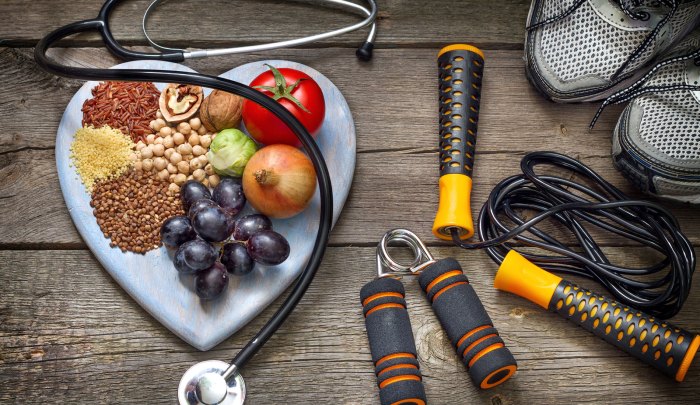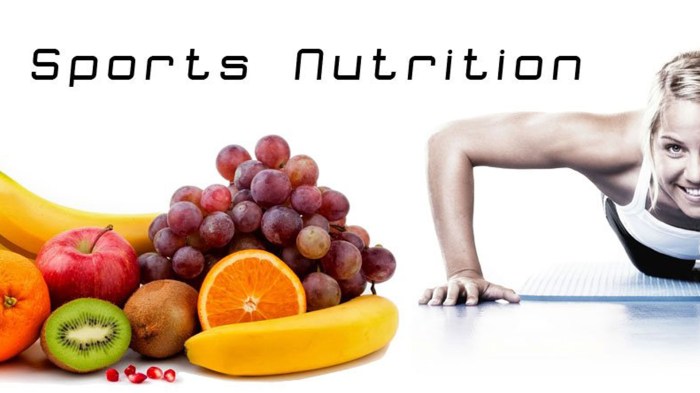Sports nutrition sets the stage for this enthralling narrative, offering readers a glimpse into a story that is rich in detail with American high school hip style and brimming with originality from the outset.
From the role of macronutrients in energy provision to the importance of hydration in optimizing performance, the world of sports nutrition is a dynamic and vital aspect of any athlete’s regimen.
Overview of Sports Nutrition

Sports nutrition plays a crucial role in enhancing athletic performance by providing the necessary nutrients for energy, recovery, and overall health.
Importance of Proper Nutrition for Athletes
Proper nutrition can impact recovery time, reduce the risk of injury, and optimize performance during training and competition.
Key Nutrients for Athletes
- Protein: Essential for muscle repair and growth.
- Carbohydrates: Provide energy for workouts and replenish glycogen stores.
- Fats: Aid in hormone production and help absorb fat-soluble vitamins.
- Vitamins and Minerals: Support overall health and play a role in various bodily functions.
- Hydration: Crucial for maintaining optimal performance and preventing dehydration.
Macronutrients for Athletes

Fueling your body properly is key to athletic performance. Let’s break down the role of macronutrients in your diet.
Carbohydrates for Energy
Carbohydrates are the body’s primary source of fuel, especially during high-intensity workouts. They are broken down into glucose, which provides quick energy for muscles. Athletes need an adequate intake of carbs to sustain their energy levels and optimize performance.
Proteins for Muscle Repair
Proteins are essential for muscle repair and growth. During exercise, muscle fibers undergo stress and damage. Protein helps rebuild these fibers, promoting recovery and muscle development. Athletes should include lean sources of protein in their diet, such as chicken, fish, eggs, and legumes.
Healthy Fats for Endurance
Healthy fats play a crucial role in endurance sports and energy storage. They provide a concentrated source of energy and help maintain hormone levels. Including sources of healthy fats like avocados, nuts, seeds, and olive oil in your diet can support long-lasting energy levels and overall performance.
Micronutrients and Hydration
Micronutrients play a vital role in supporting athletic performance, providing essential vitamins and minerals that help the body function optimally. Hydration is equally important for athletes to prevent dehydration and maintain peak performance levels.
Essential Micronutrients for Athletes
- Vitamin D: Helps in calcium absorption for strong bones and muscles.
- Vitamin C: Supports the immune system and aids in tissue repair.
- Iron: Essential for oxygen transport in the blood, crucial for endurance athletes.
- Magnesium: Important for muscle function and energy production.
Hydration Strategies for Athletes
Proper hydration is key to preventing fatigue, muscle cramps, and heat-related illnesses during intense training sessions. Here are some tips to help athletes maintain electrolyte balance:
- Drink water regularly throughout the day, not just during workouts.
- Monitor urine color to ensure adequate hydration – aim for pale yellow.
- Include electrolyte-rich foods like bananas, nuts, and leafy greens in your diet.
- Consider sports drinks with electrolytes for longer training sessions or competitions.
Pre-Workout and Post-Workout Nutrition
To optimize performance and recovery, it’s crucial to pay attention to what you eat before and after your workout. Pre-workout nutrition focuses on providing the energy needed to fuel your exercise, while post-workout nutrition aids in muscle recovery and replenishing energy stores.
Pre-Workout Meal Plan
Before a workout, aim to consume a balanced meal that includes carbohydrates, protein, and a small amount of healthy fats. Carbohydrates are essential for providing energy, while protein helps with muscle repair and growth. Here’s an example of a pre-workout meal plan:
- Grilled chicken breast
- Brown rice
- Steamed vegetables
- Whole grain bread
- Fruit
Post-Workout Recovery Snack Recipe
After a workout, it’s important to refuel your body with the right nutrients to aid in muscle recovery. One easy and effective post-workout snack is a smoothie that combines protein, carbohydrates, and hydration. Here’s a simple recipe:
- 1 scoop of protein powder
- 1 banana
- 1 cup of almond milk
- Handful of spinach
- Ice cubes
Blend all the ingredients together and enjoy this delicious and nutritious snack to help your muscles recover and replenish energy stores.
Timing of Meals Around Workouts, Sports nutrition
The timing of your meals around your workouts can have a significant impact on your performance and recovery. Ideally, aim to eat a balanced meal containing carbohydrates and protein 2-3 hours before your workout to provide sustained energy. After your workout, consume a post-workout snack or meal within 30 minutes to an hour to maximize muscle recovery and replenish glycogen stores.